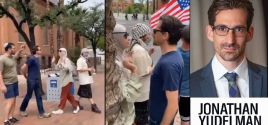Family's search for justiceBBCApr. 06, 2006 |
Popular 
Blinken Blames Social Media for Israel Losing PR War; Romney Agrees, Confirms TikTok Ban is to Help Israel

Fmr IDF Soldier And Jewish Professor Bravely Intimidate Muslim Women at Pro-Israel Protest

South Dakota Gov. Kristi Noem Admits She Did Not Meet With Kim Jong Un As Her Book Claimed

Dershowitz to Launch 'Massive Offensive Lawfare' Against 'Anti-Semitic' Pro-Palestine Protesters

'Target Israel And We Will Target You': AIPAC-Funded U.S. Senators Threaten ICC Prosecutor
 Audio: Sophy Miller Related: Justice4JamesMiller.comAfter a British inquest jury finds that cameraman James Miller was murdered, his family and friends describe their struggle for justice. Mr Miller's wife Sophy has spent nearly three years trying to find the truth behind his shooting while raising their two children. The respected cameraman was killed in Rafah, in Gaza, on 2 May 2003 while making a documentary about the impact of conflict on Palestinian children. His family have always believed he was deliberately shot by a soldier in the Israeli Defence Force (IDF). But Mrs Miller remains angry and believes there was no proper investigation. "The IDF investigations, at field level, have not actually been investigations, but debriefing between soldiers, very often the perpetrators of the crime are reporting on that crime. They are not investigations." The inquest has heard that Mr Miller approached an armoured personnel carrier, carrying a white flag which he shone a torch on, calling out that he was a British journalist and wearing a helmet marked TV. He was shot in the neck, unprotected by his body armour. He had been attempting to ask for permission to leave the area. 'Insufficient evidence' The award-winning film Death in Gaza was produced using the footage filmed by Mr Miller and reporter Saira Shah before the shooting, which happened near the home of one of three Palestinian children whose story they followed. The Israeli embassy says there was a "thorough investigation", but there was insufficient evidence to charge any soldier. But Mrs Miller said that the investigation came too late to find the truth, with three key failings. She says the Israeli investigators did not ask the IDF's nearby soldiers to surrender their guns for ballistic tests until nine weeks after the shooting, and that it then gave them a further two weeks to comply. "We asked for that many times and eventually it was allowed. It is very easy to switch the barrels." No crime scene was preserved where the shooting had taken place, with the ground being bulldozed three days afterwards, Mrs Miller said. And lastly, eyewitness statements were not taken from James' companions until the January after the shooting. Investigators sometimes talk of the "golden hours" after a crime has been committed, where evidence must be collected before it is lost. "While we were waiting vital evidence was lost and tampered with and just not collected. The Israeli assurances [of a proper investigation] were false." Mr Miller's death came just a month after the shooting of British human shield Tom Hurndall. His family have argued there is a culture in the Israeli army that allows shootings of civilians to happen. 'Swift punishment' Mrs Miller said properly investigating civilian deaths would send a message to all troops. "Investigations should be timely and swift punishment must happen to send a strong signal that this behaviour should not happen. "If you have a culture of impunity where crimes are not investigated then soldiers can quite literally get away with murder. "It is important the IDF takes steps towards accountability. It means soldiers will think twice before shooting innocent civilians." Mrs Miller said the family had had help from the Foreign Office on the ground in Israel and the occupied territories, but that officials had been naive in believing the initial Israeli investigation would be properly conducted. "The Foreign Office peddled Israeli assurances to us as if they could be taken at face value. "It has taken us a long time of continued and constant pressure to see a proper investigation occur." The Israeli Embassy said in a statement: "After a very thorough investigation using laboratories in Israel and abroad and after reviewing all the available evidence, it was not possible to reach a reliable conclusion that could provide a basis for proceedings under criminal law. "In other cases where there is sufficient evidence, those responsible are prosecuted, as in a separate case involving another British citizen when an Israeli soldier was sentenced to eight years in jail. "Those considerations regarding evidence are relevant in all legal systems, including the UK." |



